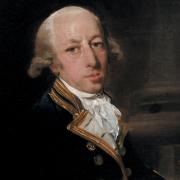From bringing the buzz of 19th century Portsmouth to life to inspiring Rudyard Kipling to take up writing in England, Sir Walter Besant was a novelist and historian who would become the first Chairman of the Society of Authors
A novelist and historian of national significance, antiquary, social reformer and critic, philanthropist, freemason, man of letters and campaigner for authors’ rights, amateur sociologist, and all-round organiser, Walter Besant was born in Portsmouth and grew up within the walls of the old town prior to aged fortifications being pulled down. The topography of Pompey would never desert him, his descriptions of the old dockyard, Portsmouth and Portsea bearing comparison with any others that have been written.
Born on August 14, 1836, a son and one of ten children to wine merchant and book collector William Besant and architect’s daughter Sarah née Ediss, Walter Besant was schooled at home, then in Southsea at St Paul’s, before continuing his studies in the capital, going on to study at King’s College, London, and Christ’s College, Cambridge from which he graduated with a view to taking holy orders.

This wasn’t to be however, and Besant actually went in to teaching. After a relatively short period teaching maths in this country, Besant worked for six years as a professor in Mauritius (of Mathematics at the Royal College) but then returned to London in 1867 and devoted his time to literature, his debut work, Studies in French Poetry, appearing in 1868, whilst he also contributed to magazines. A few years later, in 1871, Besant went into literary partnership with James Rice, the editor of Once a Week, the same year he was admitted to Lincoln’s Inn. The partnership would prove fruitful as several collaborative novels resulted including Ready-Money Mortibay and The Golden Butterfly, both extremely successful, and By Celia’s Arbour: A tale of Portsmouth town, in which he fully described the rich tapestry of his home city, The Chaplain of the Fleet, and The Seamy Side. In all they cooperated on 14 novels. In between times he’d married Mary Garrett Foster Barham in 1874, who’d remain his spouse until his dying breath over a quarter of a century later having bestowed on him four children. She’s not to be confused with the American suffragist Mary Garrett who never married.
Celia’s Arbour is quite the tale if you want to enjoy descriptions of Portsmouth; we quickly learn that the arbour of the title is actually a moniker for the Queen’s Bastion or at least its north-west corner ‘where the grass was longest and greenest, the wild convolvulus most abundant, and where the noblest of the great elms which stood upon the ramparts – “to catch the enemy’s shells,” said Leonard – threw out a gracious arm laden with leafy foliage to give a shade’. I could almost imagine being there on a nice summer’s evening as the late sun threw its shadows. He describes descending from the walls of the 1840s to walk the streets and the sailors sitting on the Common Hard in the previous decade. The book settles on Portsmouth as a place ideal for a story of political intrigue, romance, familial deception, and blackmail or ‘the comedy of humanity’ as Besant terms it. Portsmouth is a more than clever choice for this kind of work, a provincial place, a distance from London at the time, yet due to its dockyard also central to that capital’s empire.
After Rice’s early death Besant wrote All Sorts and Conditions of Men off his own bat, his first independent novel, plus other novels which advocated social reform and led to the establishment of the People’s Palace in London’s East End in 1887, an earnest attempt to provide education and recreation for slum dwellers, and one in which Besant participated. Another of his works, All in a Garden Fair, was a big influence on Rudyard Kipling who credited it with his desire to leave India to return to England and take up writing here. Other writers seem to have had mixed feelings. George Gissing, the Yorkshire-born novelist rated some of Besant’s works whilst lambasting others. This didn’t stop Besant becoming one of the founders and first Chairman of the Society of Authors in 1884, editing its journal until his death. Besant would pen another 32 novels in the 19 years between Rice’s death and his own demise.

He also contributed some biographical studies, including Rabelais, works on the history of London (ten volumes, 1902-12) and so forth. Two of Besant’s books spawned movies, The Children of Gibeon, a 1920 silent picture based on his 1886 book, and All Sorts and Conditions of Men, another silent film of 1921, based on his 1882 novel. These two books were part of a series that Besant used to try and highlight the misery being endured by the lowest classes in our industrial cities. It was writing with a social conscience in the manner of Dickens, another Portsmouth-born author, and it was probably his most successful and influential writing which helped instigate movements to assist the urban poor, particularly in the East End of London. As well as his works of fiction and non-fiction Besant also contributed at least one notable play, The Charm and other drawing-room plays, another collaboration but this time with the Londoner Walter Herries Pollock.
Besant was Secretary of the Palestine Exploration Fund, a group set up to study the Holy Land, its remit seeming to fluctuate between harmless surveying and more covert intelligence gathering. As well as editing some of that body’s works, Besant was also Chairman of the Incorporated Society of Authors (as above) and was knighted in the Birthday Honours of 1895. As his time in Mauritius and secretaryship of the Palestine Exploration Fund showed, Besant looked beyond these shores, also becoming Treasurer of the Atlantic Union, an association that sought to improve relations between Britain and America.

Walter Besant was the brother-in-law of the famous Annie Besant, née Wood, who married his brother, the Rev. Frank Besant, also Portsmouth-born, when she was 20, but was divorced from him in 1873. Annie became notable as a theosophist, indeed its high priestess from 1891 (this was a new religion established in New York City in 1875), as well as a socialist, women’s rights activist, educationist, and campaigner for Indian nationalism. Walter had another brother, the mathematician William Besant, born in Portsmouth like his two siblings.
Walter Besant died on June 9, 1901, aged 64. His autobiography was published the year after his death in 1902.
CHRONOLOGY
1836 – Walter Besant born in Portsmouth (August 14).
1859 – Graduates from Christ’s College, Cambridge.
1861 – Professor of Mathematics at Royal College, Mauritius (until 1867).
1868 – Besant’s debut work is published, ‘Studies in French Poetry’.
1871 – A fruitful partnership with James Rice begins until Rice’s death in 1882.
1874 – Marries Mary Garrett, a union that bestowed four children.
1878 – By Celia’s Arbour: a tale of Portsmouth town is published.
1887 – Establishment of the People’s Palace in East London.
1895 – Besant is knighted in the birthday honours.
1901 – Sir Walter Besant dies in London (June 9) aged 64.



























